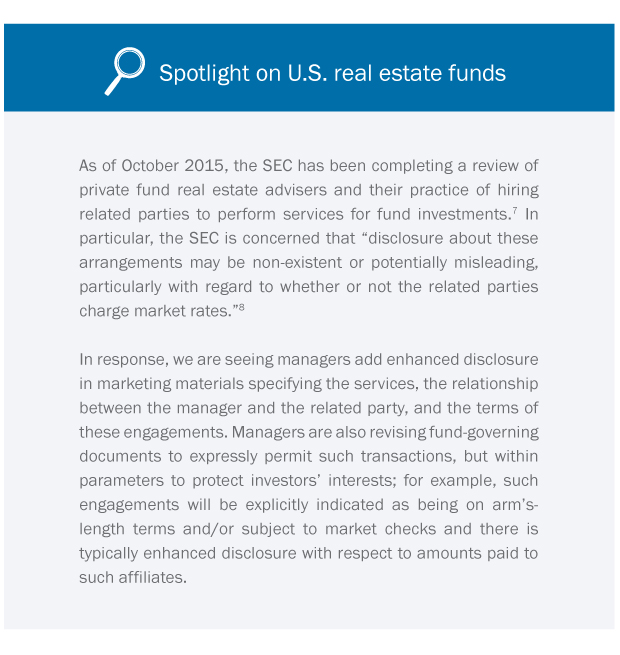In the Terms: Private Fund Transparency Takes Centre Stage

Increased scrutiny from regulators is driving a trend toward greater transparency in the private funds industry. More detailed and frequent disclosure of fees and expenses and more information and reporting around conflicts of interest and allocation policies are good examples of this trend. With regulators signaling a need for funds to continue to improve disclosure, and investor advocacy groups separately working on a set of proposed industry standards on fee disclosures, the trend toward transparency is expected to continue on both sides of the Canada-U.S. border.
Regulatory oversight
In the United States, the Securities and Exchange Commission (the SEC) now has a more complete picture of the private fund industry five years after the Dodd-Frank Act first required many managers to register and report their practices. In those five years, the SEC has gone from not knowing how many funds or managers exist to having insight into almost 30,000 private funds and 4,500 registered advisers.
This insight resulted in some notable SEC enforcement actions in 2015. In June, one manager agreed to pay almost US$30 million to settle charges that it had improperly allocated more than US$17 million in “broken deal” expenses to its flagship funds.1 In August, another manager agreed to pay US$20 million to settle charges that it had failed to disclose a US$50 million loan that a senior executive received from an investor.2 In October, a third manager agreed to pay US$39 million to settle charges that it had inadequately disclosed accelerated monitoring fees and legal discounts it had received that were substantially higher than legal discounts received by its funds.3
A running theme in these enforcement actions is inadequate disclosure to investors, ranging from a failure to describe practices in marketing materials or—in cases where disclosure occurs but the relevant fees and expenses or practices are not highlighted to investors—a failure to disclose information to investors in a sufficient way.
While increased regulatory oversight of the private funds industry has largely been a U.S. phenomenon, the practical effect is also being felt by Canadian funds which are similarly facing growing disclosure pressures from investors.
Fees and expenses
Historically, the information investors received with respect to fees and expenses has been limited, with any disclosures provided often buried in annual financial statements. As highlighted by recent enforcement actions, regulators have been particularly concerned about the payment of accelerated-monitoring fees to managers upon the sale of a business without adequate disclosure of such practices or the amounts of the fees involved. The amounts in question have been material: according to one recent estimate, up to US$3 billion in these types of fees (out of a total of US$20 billion in portfolio company fees) have been received by private fund managers from portfolio companies over the last 20 years.4
As of May 2014, the SEC had found illegal fees, compliance shortfalls or material deficiencies in controls in more than half of the private funds it examined.5 In October 2015, SEC Chair Mary Jo White emphasized the SEC’s concern that some managers may be improperly shifting expenses away from the manager by charging salaries to the fund, outsourcing services to be performed by the manager and charging inappropriate third-party fees to the fund (for instance, by hiring former employees as “consultants” paid by the fund but whose compensation does not offset the management fee), without disclosing any of this to investors.6
- Marketing. We are seeing managers include more detailed fee disclosures in their marketing materials, in particular with respect to their practices regarding administrative fees and portfolio company fees.
- Fund formation. In fund-governing documents, we are seeing expanded fee and expense definitions, and clarifications around which fees are to be paid out of the management fee as opposed to paid by a portfolio company (but not subject to offset against the management fee).
- Information rights. Periodic notices to investors of fees that both offset the management fee or are carved out of the offset and increased information regarding expenses, and broader access to information rights to request information on such fees, are also being included in fund-governing documents.
These developments have increased investors’ ability to track these types of fees and the management fee offset, as well as to track expenses that are charged to the fund.

Conflicts of interest and allocation policies
Transparency has also been historically limited with respect to how managers deal with conflicts of interest and allocation of investment opportunities across multiple funds. In the United States, the SEC has observed that some managers are not adequately disclosing conflicts of interest—for instance, hedge fund advisers allocating profitable trades and investment opportunities to their own accounts rather than client accounts in contravention of existing policies and procedures.9
Investors are focusing more on conflicts of interest (including how investment opportunities are allocated among funds), and are pushing for enhanced conflict management procedures and/or disclosure obligations. Managers are often responding with adding greater detail in marketing materials and fund-governing documents with respect to conflicts of interest, while at the same time asserting their discretion and flexibility in dealing with these conflicts.
What’s next: fee disclosure standards
Looking ahead, the Institutional Limited Partners Association (ILPA) has circulated a proposed set of standards outlining how managers should disclose fees on a quarterly basis, an initiative which is expected to enhance transparency and reduce the number of individual information requests managers receive.10
From the investors’ perspective, managers’ adoption of these standards will better enable them to compare fees charged by different managers. In addition to ILPA’s efforts, in the United States investors are petitioning the SEC to push for more transparent and frequent information on fees and expenses, as evidenced in a letter sent to the regulator in July 2015 by 13 U.S. state and city treasurers and comptrollers.
Conclusion
In 2016, we expect investors will keep advocating for enhanced disclosure while managers work to preserve their flexibility and discretion. In the meantime, increased transparency in fund marketing materials and fund-governing documents is reflective of the overall shift toward enhanced scrutiny of the industry by both regulators and investors. As managers continue to respond to these changing dynamics, we expect the growing transparency trend will bring with it tangible administrative and strategic considerations for managers in the year ahead.
_________________________
1 SEC Release No. IA-4131 (Jun. 29, 2015), available at https://www.sec.gov/litigation/admin/2015/ia-4131.pdf.
2 SEC Release No. IA-4163 (Aug. 10, 2015), available at https://www.sec.gov/litigation/admin/2015/ia-4163.pdf.
3 SEC Release No. IA-4219 (Oct. 7, 2015), available at https://www.sec.gov/litigation/admin/2015/ia-4219.pdf.
4 “Private Equity Portfolio Company Fees,” November 25, 2015, by Ludovic Phalippou, Christian Rauch and Marc Umber, available at http://papers.ssrn.com/sol3/papers.cfm?abstract_id=2702938.
5 Speech by former OCIE Director Andrew J. Bowden at the Private Fund Compliance Forum 2014: “Spreading Sunshine in Private Equity,” May 6, 2014, available at http://www.sec.gov/news/speech/2014--spch05062014ab.html.
6 Keynote Address by Chair Mary Jo White at the Managed Fund Association: “Five Years On: Regulation of Private Fund Advisers After Dodd-Frank,” October 16, 2015, available at http://www.sec.gov/news/speech/white-regulation-of-private-fund-advisers-after-dodd-frank.html.
7 Ibid.
8 Ibid.
9 Ibid.
10 ILPA New Fee Reporting Template, available at https://ilpa.org/best-practices/reporting-best-practices/for-consultation-ilpa-fee-reporting-template/.
To discuss these issues, please contact the author(s).
This publication is a general discussion of certain legal and related developments and should not be relied upon as legal advice. If you require legal advice, we would be pleased to discuss the issues in this publication with you, in the context of your particular circumstances.
For permission to republish this or any other publication, contact Richard Coombs.
© 2026 by Torys LLP.
All rights reserved.


